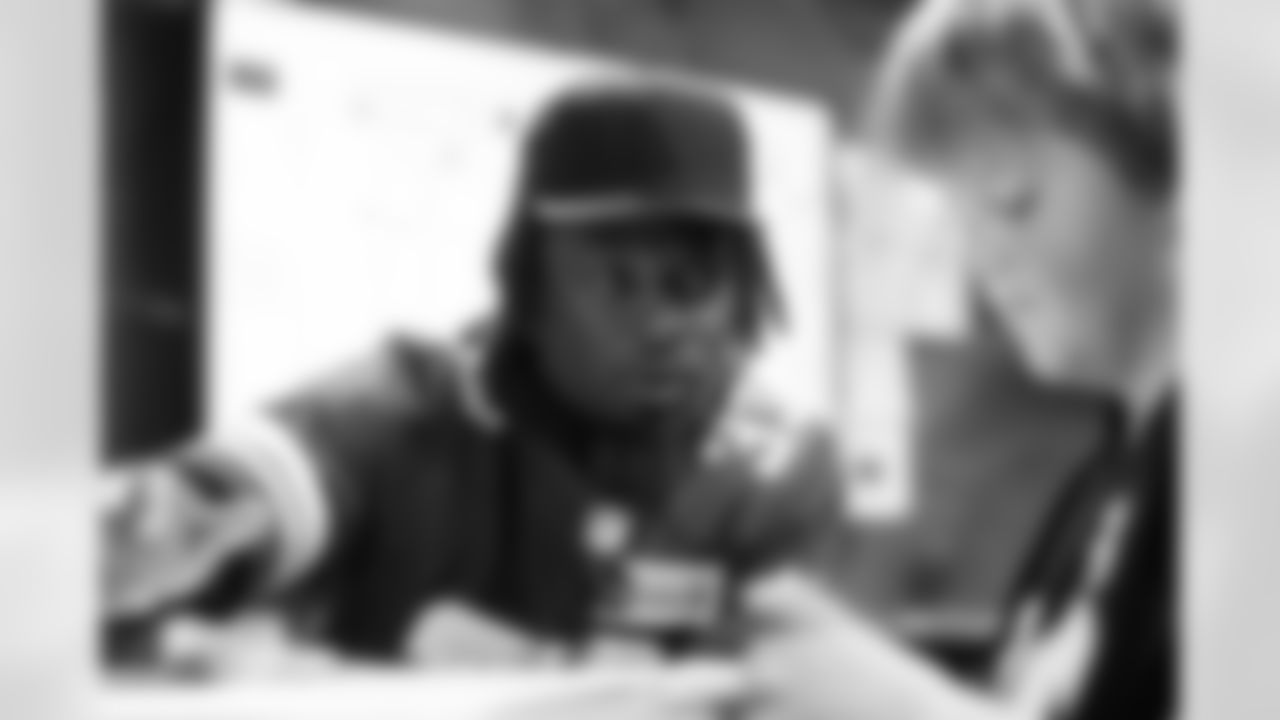ST. PAUL — Several Vikings players recently experienced a "road trip" to a place they've never been before:
Mars.
Linebackers Jordan Hicks and Brian Asamoah II, running backs Kene Nwangwu and Ty Chandler and tight end Ben Ellefson joined approximately 75 fifth-grade students from Oak View Elementary for a special STEM event called "Destination Mars" held last Tuesday at STARBASE Minnesota at the 133rd Airlift Wing of the MN National Guard base.
The players split up with the students into different classrooms where they mapped out atoms and chemical interactions, designed rockets, programmed robots, learned CAD, experienced augmented reality and were immersed in the engineering design process, along with all the successes and failures associated with it.
"It's really cool just to engage with them and just be able to see them learn," Nwangwu said.
Like the students, Nwangwu learned about science at an early age. He continued to develop his passion for the subject at Iowa State University, where Nwangwu majored in mechanical engineering.
Nwangwu said it was a unique opportunity to apply his science and engineering background with the young people.
"It was really cool being able to apply those things that you love when you're growing up into actual classes," Nwangwu said. "I think when you're at this age that's when you gravitate toward these types of curriculums, and then they can become a passion for you later in life."
Hicks added it's extremely important to be able to give back to the community.
"Whenever we show up in these jerseys, people notice," Hicks said. "It's really good for the kids to see us interacting with them, but then also having the ability to interact in a setting like this that promotes STEM learning."
The Vikings partnered with Medtronic, Medtronic Foundation and STARBASE Minnesota for the event.
"These kinds of public/private partnerships are incredibly important to the work that we do," Director of Strategic Operations for the Medtronic Foundation Liz Lund said. "We're all working very hard to elevate opportunities and remove barriers for underserved and underrepresented scholars within our area. We're specifically focused on STEM and we're thrilled to partner with STARBASE Minnesota and the Minnesota Vikings on some of these STEM endeavors.
"We're really excited that our employees are here volunteering and they have the ability to show these young scholars what they can aspire to and what they can be, and we're equally excited that the Minnesota Vikings are here to reiterate for these scholars what hard work and discipline can do when you're really focused on something," Lund continued. "STARBASE has just given us a wonderful platform to be able to allow these kids to engage in their creativity and help them understand what science, technology, engineering and math can do for them and how it can help them in their communities as they continue to grow."
View photos of Vikings players and fifth-grade students at the "Destination Mars" STEM event at STARBASE Minnesota on Nov. 1.


















One of those volunteers was Huda Yusuf. She graduated from the University of Ottawa with a degree in environmental chemistry before pursuing graduate work in British Columbia. Yusuf is now the Program Manager for the Research and Development Rotation Program at Medtronic.
"For engagement, it's not only critical that we have one point and then walk away. For us to be able to influence and be diverse in the way we help people, we have to have continuous touch points," Yusuf said. "I know the people that have made the most impact in my life have been the people who have been consistently showing up for me, even though sometimes I didn't know I needed them. Consistency will build trust, and trust will build community, so it's really important it's not a one-time [thing]. We have to make sure that we re-engage with our talent to show them the need is still there and that consistency will build the trust with the students that we're here for them and then they'll see us as role models."
Yusuf added diversification in STEM is critical as well.
"For kids to imagine what they want to be when they grow up, they have to see themselves represented in the world," Yusuf said. "So the lack of imagination, you don't see yourself reflected back has stuck people without them knowing that they're great in this work. Us coming in, from a diverse perspective at Medtronic, where you have young people, old people, people from different parts of the world. I lived in three continents, I speak three languages; them to see themselves reflected is going to be like, 'I belong there.' You can't get the best out of people if we don't foster belonging."
At the start of the event, STARBASE Executive Director Kim Van Wie welcomed everybody to STARBASE's unique STEM facility before immersing participants in the classroom to learn right along with students.
"Our secret sauce [is] a combination of where STARBASE is located – on a military base, with an air part right within our reach, creating intrigue from the very beginning. The curriculum, with a topical storyline of human missions to Mars — combined with an amazing, licensed teacher team who specialize in STEM, together, is where the rubber meets the road," Van Wie said. "We weave STEM career connections throughout the whole program so the students can see what they're doing here can mean a future STEM career, opening up opportunities for them."
Van Wie said the STARBASE program at the Fort Snelling facility is five days a week and it serves roughly 3,500 students a year. She added STARBASE also has a second location in Duluth that serves close to 2,700 students annually. All STARBASE programs are free to schools.
STARBASE Program Manager Melanie Peters said the youth can learn to grow their STEM skills.
"They can always use their creativity and [learn] if your idea doesn't work the first time when you're doing engineering, that perseverance is important," Peters said. "It's the natural world of engineering and science for things to not quite work out the first time and to have an opportunity to redesign, redo an experiment, test something again and feel pride in the success of persevering through something."
Hicks remarked that the technologies he experienced at STARBASE, such as the augmented reality is "a game changer in education", along with the problem-solving skills he saw students apply that can be useful later in life.
"I think being able to problem solve is applicable in all facets of life," Hicks said. "I've got three kids that I'm trying to teach how to do things on their own and how to learn and how to problem solve themselves. In order to be able to teach that, you've got to be put in situations where you're able to work that in your brain. Opportunities like this for the kids are what it's all about."














